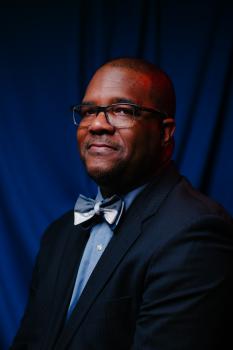Dr. Campbell Uses Johnston Fellowship to Connect Social Justice, Leadership, and Music

“A lot of artists became complacent,” said Dr. Bruce Campbell, associate professor of Education, director of the Educational Leadership Masters and Supervisory Certification programs, and 2018-20 Norman Johnston Faculty Fellowship in the Humanities and Social Sciences recipient, reflecting on how social justice messages disappeared from music produced by major record labels following the eras of Bob Dylan and Public Enemy. “[The music industry is] a business, and I think sometimes artists think, ‘I want to get signed to a major label, even if it means I can’t talk about this or that.’ Now though, there’s so many independent labels and so many ways to put out music yourself, so I think artists have had more freedom in speaking their minds.”
Since receiving the Norman Johnston Fellowship, Dr. Campbell curated two seasons worth of interviews of his Dust + Dignity podcast with international leaders and activists in music, education, fashion, and nonprofit fields to explore how music and social justice motivates and inspires them. He’s also hosted workshops about what it means to be an effective and socially responsible leader in London, England and on Arcadia’s Glenside campus. Due to COVID-19, Dr. Campbell’s final workshops in South Africa and New Zealand were indefinitely postponed.
The fellowship project, “Dust + Dignity Podcast and Workshops: Exploring Social Justice and Leadership Through Music,” started long before 2018 and is rooted in social justice. In 2016, Dr. Campbell, along with Philadelphia natives and musical professionals Angie Asombrosa, Sarah Mueller, Cosmo Baker, Rich Medina, Skeme Richards, and King Britt, hosted the “Dust + Dignity” exhibition at the Painted Bride on Vine Street in response to the recent killings of unarmed Black adults and children by police.
The name of the exhibition brings together the two topics of focus—dignity, a right of every person to be valued and respected, and dust, a term used by record collectors to describe how you get dusty while digging through old album crates. The exhibition curated over 100 albums that signified messages of social justice through the album art, music, or artist and hosted a documentary by team members who brought the exhibition together for a discussion about music and social justice.
“I was listening to Public Enemy at the time,” said Dr. Campbell. “I remember thinking there’s got to be other music that I can pull from, but I couldn’t find any and I was getting frustrated. I shared that with a friend and said to her that it’d be cool to have an art exhibit around this question about social justice and music. I’m an educator, so I wanted to educate people on the history of this music and what was going on behind the scenes, but because I love museums and art exhibitions I thought an exhibition would be a good way of doing it, as opposed to doing a lecture.”
The original idea for Dust + Dignity has not only inspired Dr. Campbell’s fellowship project, but also provided an opportunity for him to executive produce an album “Dust + Dignity: Music From the Series” by the artist Dotmatic based on the music in the podcast, and a potential book publication about the interviews. A second album being executive produced by Dr. Campbell is by the group Helsinki Headnod Convention; its first single, “Fake News,” will be released on Friday for Juneteenth, the oldest nationally celebrated commemoration of the ending of slavery in the U.S. Proceeds from the single, which will be available on Bandcamp, will go to the NAACP Legal Defense Fund.
Dr. Campbell plans to continue the podcast and build upon the Dust + Dignity brand as part of his scholarship—perhaps even returning to an exhibition. In addition to the podcast, he’s had requests to continue with workshops for adults and children.
“I think people’s reaction to the podcast has been really nice, and I didn’t think there would be so many people interested in it,” said Dr. Campbell. “I knew that a couple of people would like it, and that’s why I proposed it. But I was surprised when people posted reviews or comments, and they’ve been really, really good. Thanks for listening.”

